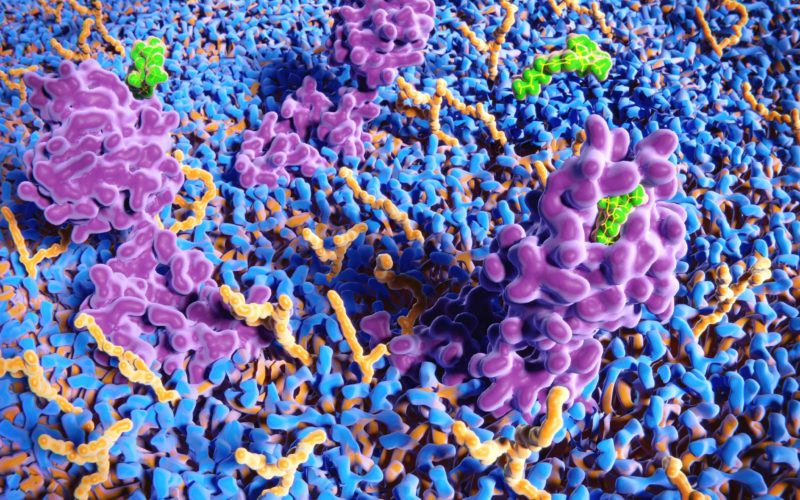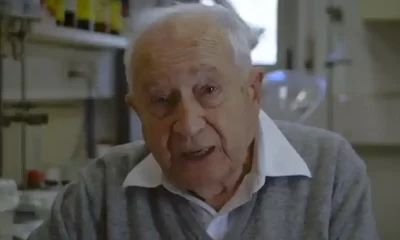Business
Israeli Company Clones Cannabis Cells—Not Plants—With Up to 12 Times the Potency

BioHarvest Sciences is changing the way we think of the cannabis plant.
Using a bioreactor, a company in Israel cloned hemp cells to culture them into a powdery biomass that contains all of cannabis’s active compounds and can be dialed up to 12 times the potency. Not to be confused with the horticultural practice of cloning, Rehovot, Israel-based BioHarvest Sciences is cloning at the cellular level.
One of the perks of this technology is the potential to minimize waste. “Portions of the plant matter from the cannabis plant are waste that can be avoided using BioHarvest Technology,” BioHarvest CEO Ilan Sobel told High Times in an email.
“Cannabis plants are grown mostly just for the flower,” Sobel continued. “The flower contains the critical trichomes which are the source of cannabinoids, terpenes and flavonoids. BioHarvest’s technology allows it to grow cannabis cells with 93% trichomes in its bioreactors.”
The biomass is not grown like a typical plant; instead it’s produced in a bioreactor. “We don’t grow the plant at all,” Sobel told The Times of Israel. “We grow them in huge bioreactors in just three weeks—while regular cannabis takes 14 to 23 weeks. Our tech can also significantly increase the levels of active ingredients, as a percent of the weight, versus what is found normally in the plant.”
And gram for gram, the team at BioHarvest say their cannabis biomass requires less water and resources than plants.
Sobel and BioHarvest insist that the cells are not genetically engineered, and that they’re identical to cells found on living plants. So while the technology may sound far-reaching to the untrained ear, it’s a great way to avoid unwanted plant matter waste and increase potency. The biomass they produce is full-spectrum, containing the variety of phytocannabinoids you’d find in a plant.
“Our composition has significant amounts of both major cannabinoids such as CBD and THC as well as significant amounts of what have been termed minor cannabinoids,” Sobel told The Times.
The team is able to crank up the potency by tinkering with the conditions inside the bioreactor. He continued, “By adjusting specific conditions to which the cells are exposed, we can create different desired compositions of active ingredients, meaning we can dial up and down the various cannabinoids [compounds].”
The team does not reveal the proprietary technology in detail, but said they have the power to increase potency 12 times, simply by changing the environment inside the bioreactor.
If you’re trying to picture in your head what it looks like, they provide a basic explanation.

BioHarvest Sciences team invented Bio-Plant CELLicitation™, which is described in detail on the website. A plant is selected that contains important active phytochemicals. Then they are cut them into small pieces and inserted into a Petri dish on a solid medium that contains nutrients. Like a plant, the cells need light, oxygen, and nutrients. Then those cells are stored in a cell bank for perpetual production. They are biofarmed and when the biomass grows enough, it’s harvested into a powder and the powder can be used for different purposes.
BioHarvest Sciences say that each gallon of water produces 54 times (!) more bioreactor material than plant material, and land requirements are slashed by over 90%.
This system also enables producers to avoid contaminants and also avoid the variation in cannabis compounds that nature dictates in plants.
On May 12, BioHarvest announced the composition of their biomass, saying that trichomes represent 93% of the cannabis biomass produced using the proprietary Bio-Plant CELLicitation™ technology, and the bitter taste of plant matter is significantly reduced.
“The bottom line is that we can make cannabis and hemp far more useful than before, at lower cost to our planetary resources,” Sober told The Times. “It is a wellness and sustainability solution from Israel that can provide a truly inspiring contribution to the world.”
Dr. Yochi Hagay and Dr. Zaki Rakib founded BioHarvest after meeting in 2007. Beyond cannabis, BioHarvest Sciences’ first product, Vinia, is derived from red grape cells and contains a rich complex of polyphenols which is good for cardiovascular health. The company currently has a footprint in the U.S. and Canada.
Business
New Mexico cannabis operator fined, loses license for alleged BioTrack fraud

New Mexico regulators fined a cannabis operator nearly $300,000 and revoked its license after the company allegedly created fake reports in the state’s traceability software.
The New Mexico Cannabis Control Division (CCD) accused marijuana manufacturer and retailer Golden Roots of 11 violations, according to Albuquerque Business First.
Golden Roots operates the The Cannabis Revolution Dispensary.
The majority of the violations are related to the Albuquerque company’s improper use of BioTrack, which has been New Mexico’s track-and-trace vendor since 2015.
The CCD alleges Golden Roots reported marijuana production only two months after it had received its vertically integrated license, according to Albuquerque Business First.
Because cannabis takes longer than two months to be cultivated, the CCD was suspicious of the report.
After inspecting the company’s premises, the CCD alleged Golden Roots reported cultivation, transportation and sales in BioTrack but wasn’t able to provide officers who inspected the site evidence that the operator was cultivating cannabis.
In April, the CCD revoked Golden Roots’ license and issued a $10,000 fine, according to the news outlet.
The company requested a hearing, which the regulator scheduled for Sept. 1.
At the hearing, the CCD testified that the company’s dried-cannabis weights in BioTrack were suspicious because they didn’t seem to accurately reflect how much weight marijuana loses as it dries.
Company employees also poorly accounted for why they were making adjustments in the system of up to 24 pounds of cannabis, making comments such as “bad” or “mistake” in the software, Albuquerque Business First reported.
Golden Roots was fined $298,972.05 – the amount regulators allege the company made selling products that weren’t properly accounted for in BioTrack.
The CCD has been cracking down on cannabis operators accused of selling products procured from out-of-state or not grown legally:
- Regulators alleged in August that Albuquerque dispensary Sawmill Sweet Leaf sold out-of-state products and didn’t have a license for extraction.
- Paradise Exotics Distro lost its license in July after regulators alleged the company sold products made in California.
Golden Roots was the first alleged rulebreaker in New Mexico to be asked to pay a large fine.
Source: https://mjbizdaily.com/new-mexico-cannabis-operator-fined-loses-license-for-alleged-biotrack-fraud/
Business
Marijuana companies suing US attorney general in federal prohibition challenge

Four marijuana companies, including a multistate operator, have filed a lawsuit against U.S. Attorney General Merrick Garland in which they allege the federal MJ prohibition under the Controlled Substances Act is no longer constitutional.
According to the complaint, filed Thursday in U.S. District Court in Massachusetts, retailer Canna Provisions, Treevit delivery service CEO Gyasi Sellers, cultivator Wiseacre Farm and MSO Verano Holdings Corp. are all harmed by “the federal government’s unconstitutional ban on cultivating, manufacturing, distributing, or possessing intrastate marijuana.”
Verano is headquartered in Chicago but has operations in Massachusetts; the other three operators are based in Massachusetts.
The lawsuit seeks a ruling that the “Controlled Substances Act is unconstitutional as applied to the intrastate cultivation, manufacture, possession, and distribution of marijuana pursuant to state law.”
The companies want the case to go before the U.S. Supreme Court.
They hired prominent law firm Boies Schiller Flexner to represent them.
The New York-based firm’s principal is David Boies, whose former clients include Microsoft, former presidential candidate Al Gore and Elizabeth Holmes’ disgraced startup Theranos.
Similar challenges to the federal Controlled Substances Act (CSA) have failed.
One such challenge led to a landmark Supreme Court decision in 2005.
In Gonzalez vs. Raich, the highest court in the United States ruled in a 6-3 decision that the commerce clause of the U.S. Constitution gave Congress the power to outlaw marijuana federally, even though state laws allow the cultivation and sale of cannabis.
In the 18 years since that ruling, 23 states and the District of Columbia have legalized adult-use marijuana and the federal government has allowed a multibillion-dollar cannabis industry to thrive.
Since both Congress and the U.S. Department of Justice, currently headed by Garland, have declined to intervene in state-licensed marijuana markets, the key facts that led to the Supreme Court’s 2005 ruling “no longer apply,” Boies said in a statement Thursday.
“The Supreme Court has since made clear that the federal government lacks the authority to regulate purely intrastate commerce,” Boies said.
“Moreover, the facts on which those precedents are based are no longer true.”
Verano President Darren Weiss said in a statement the company is “prepared to bring this case all the way to the Supreme Court in order to align federal law with how Congress has acted for years.”
While the Biden administration’s push to reschedule marijuana would help solve marijuana operators’ federal tax woes, neither rescheduling nor modest Congressional reforms such as the SAFER Banking Act “solve the fundamental issue,” Weiss added.
“The application of the CSA to lawful state-run cannabis business is an unconstitutional overreach on state sovereignty that has led to decades of harm, failed businesses, lost jobs, and unsafe working conditions.”
Business
Alabama to make another attempt Dec. 1 to award medical cannabis licenses

Alabama regulators are targeting Dec. 1 to award the first batch of medical cannabis business licenses after the agency’s first two attempts were scrapped because of scoring errors and litigation.
The first licenses will be awarded to individual cultivators, delivery providers, processors, dispensaries and state testing labs, according to the Alabama Medical Cannabis Commission (AMCC).
Then, on Dec. 12, the AMCC will award licenses for vertically integrated operations, a designation set primarily for multistate operators.
Licenses are expected to be handed out 28 days after they have been awarded, so MMJ production could begin in early January, according to the Alabama Daily News.
That means MMJ products could be available for patients around early March, an AMCC spokesperson told the media outlet.
Regulators initially awarded 21 business licenses in June, only to void them after applicants alleged inconsistencies with how the applications were scored.
Then, in August, the state awarded 24 different licenses – 19 went to June recipients – only to reverse themselves again and scratch those licenses after spurned applicants filed lawsuits.
A state judge dismissed a lawsuit filed by Chicago-based MSO Verano Holdings Corp., but another lawsuit is pending.
Source: https://mjbizdaily.com/alabama-plans-to-award-medical-cannabis-licenses-dec-1/
-

 Business2 years ago
Business2 years agoPot Odor Does Not Justify Probable Cause for Vehicle Searches, Minnesota Court Affirms
-

 Business2 years ago
Business2 years agoNew Mexico cannabis operator fined, loses license for alleged BioTrack fraud
-

 Business2 years ago
Business2 years agoAlabama to make another attempt Dec. 1 to award medical cannabis licenses
-

 Business2 years ago
Business2 years agoWashington State Pays Out $9.4 Million in Refunds Relating to Drug Convictions
-

 Business2 years ago
Business2 years agoMarijuana companies suing US attorney general in federal prohibition challenge
-

 Business2 years ago
Business2 years agoLegal Marijuana Handed A Nothing Burger From NY State
-

 Business2 years ago
Business2 years agoCan Cannabis Help Seasonal Depression
-

 Blogs2 years ago
Blogs2 years agoCannabis Art Is Flourishing On Etsy













